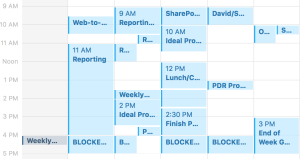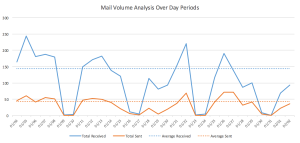I saw an article recently that hit home with me. The article, titled The Not-to-Do List — 7 Habits That Are Sabotaging Your Productivity and Happiness , was written by John Meyer, Co-Founder and CEO of Lemonly.
Here are Meyer’s seven recommendations for things you should stop doing, along with my thoughts:
1. Touching emails more than once.
While Meyer calls it “only hold it once” (or OHIO), I’ve also heard it called the “touch it once” rule or the “one touch rule”. I personally use the latter (OTR). Lots of productivity sites tout this as a key aspect of reaching another concept called “Inbox Zero”, which suggests that you should empty your inbox each day. I question the value of this since an empty inbox at 5PM isn’t necessarily in the same state 30 minutes later. It’s always seemed to me to make more sense to just try to get through your email as quickly and efficiently as possible. If you clear it out, that’s great. If you don’t, who cares?
I average about 150 received emails and about 40 sent emails per day. That’s absurd.
That said, I choose what emails to first read based on the subjects. If you send emails with stupid subjects, it’s likely you’ll be low on priority list. Once I open an email, my GTD mentality kicks in, and I either do something (respond to provide information), delegate it (forward it to someone else with direction about what I expect them to do), defer it (add something related to my OmniFocus task management application) or delete it.
Bottom line: Coming back to it will often require me to read it again and that’s a waste of time. I try not to do this.
2. Meeting just to meet.
My current company is not the worst I’ve seen, but it’s bad. I hate meetings that don’t have a clearly-defined purpose, include people who don’t need to be there (worse, when they want to be part of the conversation) or evolve into something that doesn’t involve me or require my input. If you invite me to a meeting on an invitation that doesn’t include a clear description of the purpose or have an agendum attached, it’s likely that I’ll decline it. My weekdays are busy enough as is with meetings I do need to be in; don’t invite me to silliness.
 In between meetings, I still have to get my work done. I have a lot of that to do. There’s nothing worse than the guy who schedules a meeting about, well, who knows what? And then adds everyone and their brother to the invitation. That guy sucks. Don’t be that guy.
In between meetings, I still have to get my work done. I have a lot of that to do. There’s nothing worse than the guy who schedules a meeting about, well, who knows what? And then adds everyone and their brother to the invitation. That guy sucks. Don’t be that guy.
3. Meeting without an agenda.
Once you’re in the meeting, have a clear list of things that need to be discussed/decided. Stay on track and move through them. Then close the meeting. Nobody wants you to make small talk to use up the time you have left. We’re busy, remember?
4. Repeating mistakes.
This is one way to waste a ton of time. Do something wrong and spend 3x as long as you should have if you’d done it right, then don’t pay attention to where it went off the tracks, and do it again.
I’m a big fan of documenting processes. I’m a bigger fan of documenting efficient processes. When you find a better way to do something, throw together (at minimum) a quick process document. Whether it’s a process flow or just an outline of steps, you’ll appreciate it later when you have to perform the task again. So will the person who takes the task over when you get that big promotion you’ve been hoping to land.
5. Using a phone as an alarm.
The idea behind this item was that it encourages you to read before falling asleep, which interferes with your ability to sleep soundly. There’s plenty of research to support this, and Apple has just released Night Shift on iOS to reduce blue light at night before going to bed.
I get it. I really do. I’m probably not going to stop reading my phone before bed though. Also, I don’t use my phone as an alarm; I just read on my phone before bed. Maybe Meyer should have titled this one simply “Stop reading your phone before bedtime.”
6. Allowing app notifications.
The value of this can’t be overstated. Unplug if you have to focus on something. I have a GTD context specifically for items that require deep thought. It’s called — brace yourself — Deep Thought. When I work on a Deep Thought task, I put my phone away in my bag. I close Outlook so that I don’t see incoming emails. I close my chat application so my colleagues can’t message me. I’ve even been known to take my laptop and run off to undisclosed locations around the campus to hide from everyone. It’s amazingly productive.
7. Being a chameleon.
This last item in Meyer’s list suggests that you should be forthright with people rather than being a people-pleaser. It’s more honest and respectable to just be upfront with them.
I don’t really have the problem. I’m pretty blunt and to-the-point, sometimes perhaps to a fault. I’m getting better about that though.
And I’m going to add a couple more here:
Multitasking. Or more specifically, not multitasking.
Only about 2% of people can actually multitask. You know that person who always gets caught doing other stuff during conference calls, and as soon as someone calls on him, he responds by saying, “Oh, sorry.. I was multitasking. What did you say?”
Here’s the thing.. if you were multitasking, you would have been doing that other thing you were doing and been an active participant in the call you’re on. The problem is that you weren’t multitasking. At all. You just weren’t paying attention and got busted. Those are very different things.
Checking email throughout the day.
Checking email during the day is bad. It takes you away from things that you are trying to get done and has the potential to send you spiraling down a rabbit hole. For a while, I booked specific time on my calendar to clear out mail. And I always made this late in the afternoon. Answering email in the morning is risky. Inevitably someone is asking you for your input on something that is going to come back to you later as an urgent task that is needed by the end of the day. Respond to emails late in the day and you’ve at least bought yourself an additional day.
It’s hard to only do email once during the day — we all feel compelled to monitor email — I understand. But this is why using the subject lines to prioritize and then only touching email once is so important.
What suggestions do you have for cutting out bad habits that impact productivity?



